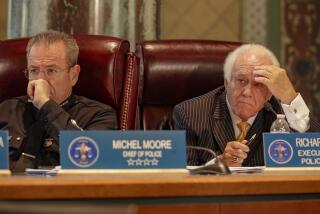Work-at-Home Trend Challenges City Lawmakers
- Share via
The San Fernando Valley composer takes pains to ensure there is no audible evidence that he’s breaking the law.
His neighbors, he says, are none the wiser that he is illegally operating a business in their midst, thanks to the soundproofing his backyard recording studio has undergone.
He’s a one-man band in his state-of-the-art studio stocked with $100,000 worth of digital equipment, synthesizers, samplers and a Macintosh computer. But he’s not one of a kind.
“Judging by the rate [at which] the technology is progressing, for not much money anybody can be set up on a professional level to produce music at home. I wouldn’t be surprised if [in] every seventh house on your block,” someone is writing music, said the composer, who asked for anonymity because he doesn’t want the city of Los Angeles to know what he’s doing.
Despite the advances in technology and the precautions he’s taken, his business--producing theme and background music for movies and TV shows--is among a few that would continue to be barred under a proposed city ordinance that would allow home-based businesses in residential areas. The proposal’s passage would mean that after more than a decade of debate, the city is finally accepting advances that enable thousands of underground enterprises to operate from bedrooms, dens and garages. But not all of them.
The composer’s plight illustrates how difficult it is for cities across the country to keep up with the rapid pace of technological change that is fueling home office growth. Like Los Angeles, they are scrambling to update their business regulations as increasing numbers of people work from home. For example, until recently Chicago banned home-operated firms if they used electricity.
“I get calls daily from cities wanting information,” said David Schmitt, executive director of the Small Office/Home Office Assn., a 2-year-old group based in Reston, Va., that represents home offices nationwide.
An estimated 13 million individuals nationwide derive their primary income from home-based businesses, an additional 14 million work part time, and 8 million are salaried employees working for someone else from home.
SOHOA has been urging cities to adopt home-based business ordinances that allow for change. Instead of listing permitted uses, which can become outdated overnight, the group argues for performance-based standards--rules that ensure that businesses don’t harm the quality of life in neighborhoods.
Los Angeles’ proposed ordinance, which would take effect immediately if approved by the City Council next month and signed by the mayor, attempts to protect residential areas.
To meet the objections of opponents who argued that the ordinance would increase traffic and allow noisy businesses to disrupt the peace and quiet of neighborhoods, the council imposed a list of 20 conditions that home-based businesses must meet. It also prohibited about 15 types of enterprises, including auto repair, massage and towing services.
But some of the banned businesses are not necessarily disruptive, said Paul Edwards, a Santa Monica-based author and nationally recognized authority on home-based businesses.
Animal trainers, who would be prohibited under the ordinance, could conceivably do most of their work away from home, he said.
Also banned are film, music and video studios, which can include one-person operations run by a video editor or a composer wearing headphones in a virtually sound-free environment, Edwards said. The ban on studios is intended to keep large production crews out of residential areas, city officials say.
The banned categories could change, said Ken Bernstein, an aide to Councilwoman Laura Chick, who proposed the ordinance.
Current city law is silent on home-based businesses. Instead, Los Angeles zoning laws simply require that business be conducted only in commercially zoned neighborhoods. Businesses operating within the city limits must have a license.
Without legal permission to operate in residential neighborhoods, home-based businesses could be arbitrarily forced out of business, said Judith Corbett, citing her own example.
After her husband died, Corbett moved her business, J&M; Costumers, from commercial space to her North Hollywood home. When an acquaintance in a personal dispute unrelated to the business reported her to zoning authorities in 1993, Corbett said, she spent $20,000 in attorney’s fees fighting to get a zoning exemption and stay in business.
“At least with this [home-based business ordinance] in place, people won’t have to be afraid that they can be put out of business just because they’re running a business,” she said.
Some businesses may be reluctant to obtain a license, however.
Many home-based businesses keep a low profile for a variety of reasons, not the least of which is that many see no benefit to declaring themselves and having to pay thousands of dollars in taxes, Edwards said.
“A significant number of people are unaware that they even have to get a business license,” he said. “I’ll give seminars and people will say, ‘I didn’t know I had to get a business license; I’m just doing some writing or videotaping from home.’ ”
The basic rule is that if an activity is a business for income tax purposes, it’s a business for city law purposes, Edwards said.
(BEGIN TEXT OF INFOBOX / INFOGRAPHIC)
Proposed Rules
The Los Angeles City Council voted to permit home-based businesses to legally operate in the city. Below are key provisions of the ordinance, which will be drafted by the city attorney’s office for final approval within a month.
Businesses would:
1. Pay a $25 annual registration fee.
2. Pay a business license tax on gross receipts ($1.18 to $5.91 per $1,000 of sales).
3. Pay 3.75% surtax on the business license tax.
4. Meet a checklist of conditions, including:
* No alterations to the residential appearance.
* No disruption to the neighborhood.
* No more than one client visit hourly, from 8 a.m. to 8 p.m. Monday through Saturday.
* No more than two deliveries and pickups daily.
* No nonresidential mechanized equipment.
* No advertising that shows the home address.
* No excessive noise, light, dust fumes or vibrations.
* No extremely hazardous substances.
* No renting of home-business space.
* No retail sales.
5. Pay a fine of $250 for the first violation, $500 thereafter.
More to Read
Sign up for Essential California
The most important California stories and recommendations in your inbox every morning.
You may occasionally receive promotional content from the Los Angeles Times.













